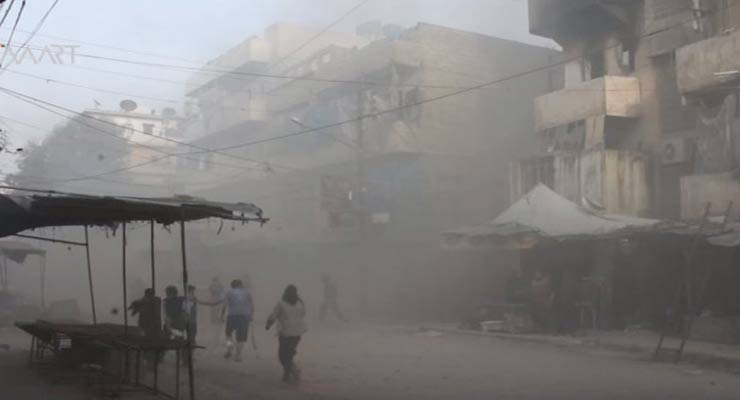 The good news is that World War III has not started. But the bad news is that nothing in Syria will be improved by Western powers’ airstrikes, writes Christian F. Trippe.
The good news is that World War III has not started. But the bad news is that nothing in Syria will be improved by Western powers’ airstrikes, writes Christian F. Trippe.
We won’t know for some time how close the world has come to the brink of war between the two nuclear superpowers, the US and Russia, in mid-April 2018. For now, it seems clear that the US, the UK and France have held back and that their attacks have been limited to targets in Syria related to the production and storage of chemical warfare agents. While it is difficult to get a clear picture of anything that is going on in Syria and caution is necessary in dealing with any reports, it seems, according to available information, that there have been practically no civilian casualties.
Military rationality?
In recent days parallels have been drawn increasingly to the Cuban missile crisis, the confrontation between the Soviet Union and the USA in 1962. Looking at the public statements being made, it seems the world has certainly reached such a point again — at least going by Donald Trump’s crazy tweets and the grandiose threats that have been made by Russian officials. But back then, it was a matter of maintaining the primacy of politics over the military generals and a Kubrickesque “Dr Strangelove” mentality on both sides. This was successful 56 years ago and the crisis remained a political one.
Now, however, in the last few days before the airstrikes on Syria, warnings were heard on both sides of the Atlantic that sometimes sounded like anxious prayers: Hopefully the rationality of the military will prevail this time. The rationality and expertise of military generals versus the ignorance and ruthlessness of politicians — you need to have a special kind of political humor to find this funny.
Careful choice of targets
Just to recap: There are currently several thousand Russian soldiers in Syria, who are fighting on the side of Assad’s troops. Two months ago, Russian mercenaries were killed following attacks by the US Air Force in northern Syria. This did not lead to a crisis. The US-led coalition against the “Islamic state” has been operating in northern Syria. This time, the air raids’ targets were selected to avoid hitting any Russian soldiers.
The dialogue between the US and Russian military leaderships seems to be stable. Experts have reported for some time that the professional and reasonably trusting exchange between high-ranking people in uniform on both sides has hardly suffered — despite the new East-West confrontation.
Syria is perhaps the most complex theater of war in history. Again and again, troops whose countries are either nominally still allied or politically deeply hostile have come into confrontation on Syrian soil. Russia’s intervention on Assad’s side and Syria’s alliance with Iran have decided the ultimate outcome of the Syrian civil war. The so-called retaliatory strikes by the three Western powers will do nothing to change this. However, this does not mean that they are pointless.

 Syrian rebel groups continue the armed occupation of Aleppo, conducting airstrikes against the city’s Armenian districts.
Syrian rebel groups continue the armed occupation of Aleppo, conducting airstrikes against the city’s Armenian districts. U.S.-led coalition warplanes carried out intense airstrikes Tuesday on Raqqa, the de facto Syrian capital of the Islamic State group, a monitoring group said, continuing days of air-raids that appear to be aimed at demoralizing jihadist fighters before an offensive by Kurdish-led forces on villages to the north of the city.
U.S.-led coalition warplanes carried out intense airstrikes Tuesday on Raqqa, the de facto Syrian capital of the Islamic State group, a monitoring group said, continuing days of air-raids that appear to be aimed at demoralizing jihadist fighters before an offensive by Kurdish-led forces on villages to the north of the city.





